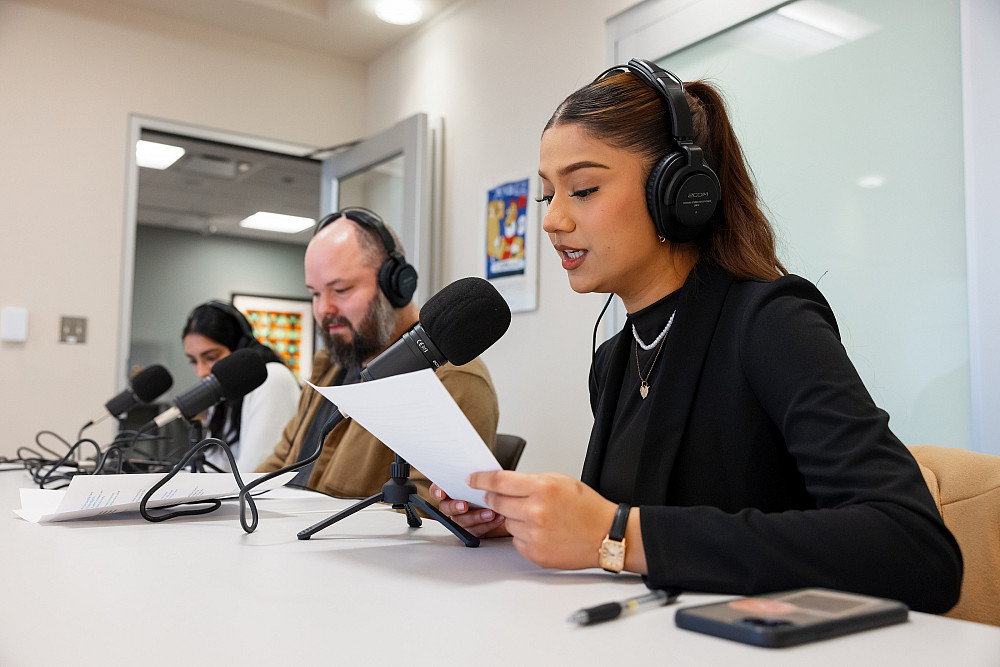<img width="1000" height="667" alt="Ramani Satishkumar, Nathan Schmidt and Snehvir Kaur record the Space Oddities podcast in University Library." data-alt="Ramani Satishkumar, Nathan Schmidt and Snehvir Kaur record the Space Oddities podcast in University Library." data-caption="Ramani Satishkumar, Nathan Schmidt and Snehvir Kaur record the "Space Oddities" podcast, which explores solar eclipses across human history. Photo by Liz Kaye, Indiana University” src=”https://static.beescdn.com/news.myworldfix.com/2024/04/20240401190037197.jpg” title=”20240327 Eclipse Podcast (LK)” srcset=”https://news.iu.edu/live/image/scale/2x/gid/2/width/1000/height/667/11884_20240327_Eclipse_Podcast_LK_075.rev.1711978343.JPG 2x, https://news.iu.edu/live/image/scale/3x/gid/2/width/1000/height/667/11884_20240327_Eclipse_Podcast_LK_075.rev.1711978343.JPG 3x” data-max-w=”3200″ data-max-h=”2134″>
Ramani Satishkumar, Nathan Schmidt and Snehvir Kaur record the “Space Oddities” podcast, which explores solar eclipses across human history. Photo by Liz Kaye, Indiana University
While the April 8 total solar eclipse will be a once-in-a-lifetime sight for many, the Indiana University Indianapolis Arts and Humanities Institute is building excitement using a different sense: sound.
Its 40-minute “Space Oddities” podcast takes listeners on a journey of solar eclipses across human history, from ancient Babylon to the first motion picture film recording of a solar eclipse. The podcast explores five historical objects while discussing the role of eclipses throughout the history of science and culture.
“We are thinking about the eclipse in the context of world history, examining historical objects that have been left behind by different cultures around the world,” said Jason Kelly, director of the IU Indianapolis Arts and Humanities Institute. “We’re engaging with these objects as a way to look at the eclipse as a historical phenomenon and the ways that people have thought about their world in different places and times.”
The podcast is one of several projects being completed through the First-Year Research Immersion Program, which immerses new students in research, scholarship and creative activity on the Indianapolis campus. The IU Indianapolis Arts and Humanities Institute has long supported students, providing them unique opportunities to participate in collaborative, community-engaged research projects that build transferrable skills to help them excel in future careers.
<img width="500" height="333" alt="Ramani Satishkumar and Nathan Schmidt record the Space Oddities podcast in University Library." data-alt="Ramani Satishkumar and Nathan Schmidt record the Space Oddities podcast in University Library." data-caption=""Space Oddities," produced by the IU Indianapolis Arts and Humanities Institute, explores the the history and culture of eclipses. Photo by Liz Kaye, Indiana University” src=”https://static.beescdn.com/news.myworldfix.com/2024/04/20240401190042137.jpg” title=”20240327 Eclipse Podcast (LK)” srcset=”https://news.iu.edu/live/image/scale/2x/gid/2/width/500/height/333/11885_20240327_Eclipse_Podcast_LK_025.rev.1711979254.JPG 2x, https://news.iu.edu/live/image/scale/3x/gid/2/width/500/height/333/11885_20240327_Eclipse_Podcast_LK_025.rev.1711979254.JPG 3x” data-max-w=”3200″ data-max-h=”2134″ loading=”lazy”>
“Space Oddities,” produced by the IU Indianapolis Arts and Humanities Institute, explores the the history and culture of eclipses. Photo by Liz Kaye, Indiana University
“Space Oddities” builds on the success of another institute-produced podcast called “Justice and War in American History,” which was funded by the National Endowment for the Humanities. The podcasts are part of the institute’s broader interest in ways audio recording might help scholars imagine, question, and create humanistic and artistic narratives. In spring 2023, the institute hosted anthropologist, sound artist and filmmaker Gustavo Valdivia, who offered workshops on field recording for faculty, students and community members.
“We are thinking about narrative in ways that are not necessarily visual or textual, such as how soundscapes shape how we think about our world and how we experience our work and tell our stories,” Kelly said. “Podcasts come under this broader umbrella of thinking about how we listen and tell stories with sound. We thought the eclipse was the perfect opportunity to use the skills students have been learning about soundscapes to tell a story about this amazing phenomenon.”
School of Science students Snehvir Kaur and Ramani Satishkumar have played a critical role in the production of “Space Oddities,” researching important eclipse objects, participating in script development and interviewing IU faculty experts for the podcast.
“Participating in the eclipse podcast has been an incredibly enriching experience for me, especially as it ventures beyond my typical area of study,” Kaur said. “Exploring the intersections of science, culture and history through this project has been both enlightening and invigorating. I was drawn to this project because it offers a unique opportunity to engage with diverse perspectives and disciplines, fostering a deeper understanding of the eclipse phenomenon and its significance across various domains.”
Though this type of project is beyond the students’ traditional studies in the sciences, the experience has provided them with an opportunity to learn how to make arguments and construct a story in a way that is accessible to many people — an important skill set that may benefit them in the future.
“Through this experience, I have gained a newfound appreciation for interdisciplinary collaboration and the power of storytelling in conveying complex scientific concepts to broader audiences,” Kaur said. “The podcast has allowed me to expand my horizons, challenge my assumptions and cultivate a more holistic approach to learning.”
For Nathan Schmidt, a postdoctoral fellow leading the project, helping students see beyond the bounds of their major has been incredibly rewarding.
“Having a firm grasp of audio recording and editing can prove useful in so many ways, despite what the students’ future careers may be,” Schmidt said. “We’re not encouraging them to think about themselves solely as a budding neuroscientist and computer scientist, but as a whole person who has meaningful ways to engage with the world that goes beyond the boundaries of their career.”
